专题讲解祈使句及练习
- 格式:docx
- 大小:76.09 KB
- 文档页数:18
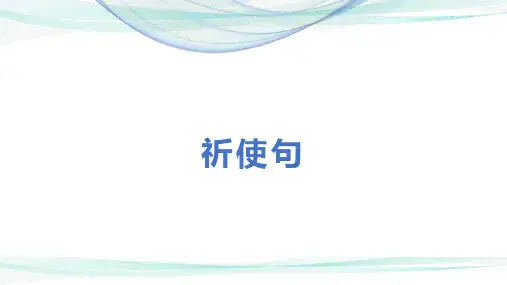
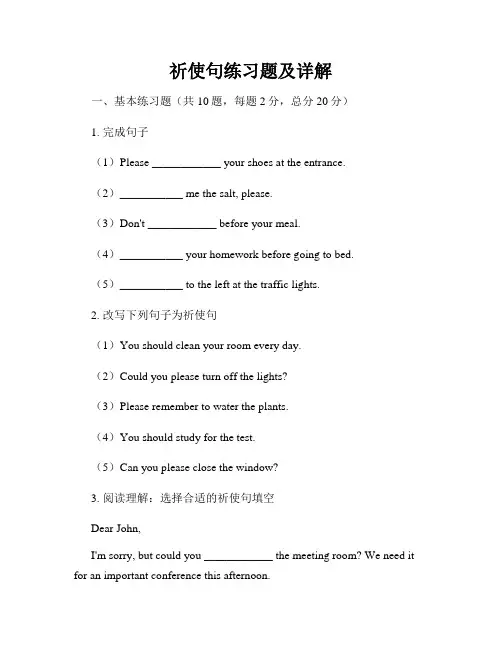
祈使句练习题及详解一、基本练习题(共10题,每题2分,总分20分)1. 完成句子(1)Please ____________ your shoes at the entrance.(2)___________ me the salt, please.(3)Don't ____________ before your meal.(4)___________ your homework before going to bed.(5)___________ to the left at the traffic lights.2. 改写下列句子为祈使句(1)You should clean your room every day.(2)Could you please turn off the lights?(3)Please remember to water the plants.(4)You should study for the test.(5)Can you please close the window?3. 阅读理解:选择合适的祈使句填空Dear John,I'm sorry, but could you ____________ the meeting room? We need it for an important conference this afternoon.Thanks,Sarah(1)clean(2)reserve(3)unlock(4)decorate二、进阶练习题(共5题,每题4分,总分20分)1. 根据情境填空(1)Your friend is about to leave your house. You want to remind them to take their umbrella. What would you say? ________________(2)You are in a restaurant and your food is too spicy. You want to ask the waiter to make it milder. What would you say? ________________(3)You are giving directions to a lost tourist. You want to tell them to turn right at the next intersection. What would you say? ________________(4)You are at a party and your friend is being too loud. You want to ask them to lower their voice. What would you say? ________________(5)You want to remind your sibling to finish their homework before watching TV. What would you say? ________________2. 根据情境改写句子(1)Could you please pass me the salt?(情境:在餐桌上,你想要盐)(2)Don't talk on your phone while driving.(情境:你在提醒朋友注意交通安全)(3)Could you please help me carry these bags?(情境:你需要帮助拿东西)(4)Let's go to the park and play soccer.(情境:你在邀请朋友一起去公园踢球)(5)Please don't forget to lock the door when you leave.(情境:你在提醒别人离开时要锁门)三、高级练习题(共5题,每题6分,总分30分)1. 根据情境完成对话情境:你在教一个学生如何使用电脑,你希望他能打开一个文件夹。
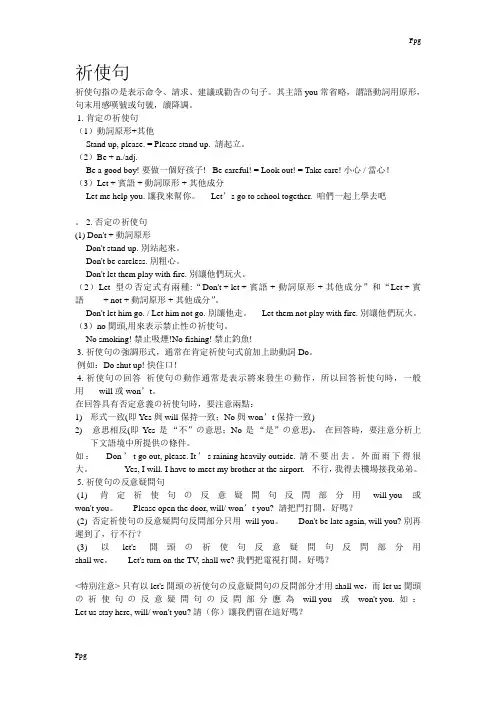
祈使句祈使句指の是表示命令、請求、建議或勸告の句子。
其主語you常省略,謂語動詞用原形,句末用感嘆號或句號,讀降調。
1. 肯定の祈使句(1)動詞原形+其他Stand up, please. = Please stand up. 請起立。
(2)Be + n./adj.Be a good boy! 要做一個好孩子! Be careful! = Look out! = Take care! 小心 / 當心!(3)Let + 賓語 + 動詞原形 + 其他成分Let me help you. 讓我來幫你。
Let’s go to school together. 咱們一起上學去吧。
2. 否定の祈使句(1) Don't + 動詞原形Don't stand up. 別站起來。
Don't be careless. 別粗心。
Don't let them play with fire. 別讓他們玩火。
(2)Let型の否定式有兩種:“Don't + let + 賓語 + 動詞原形 + 其他成分”和“Let + 賓語 + not + 動詞原形 + 其他成分”。
Don't let him go. / Let him not go. 別讓他走。
Let them not play with fire. 別讓他們玩火。
(3)no開頭,用來表示禁止性の祈使句。
No smoking! 禁止吸煙!No fishing! 禁止釣魚!3. 祈使句の強調形式,通常在肯定祈使句式前加上助動詞Do。
例如:Do shut up! 快住口!4. 祈使句の回答祈使句の動作通常是表示將來發生の動作,所以回答祈使句時,一般用 will或won’t。
在回答具有否定意義の祈使句時,要注意兩點:1)形式一致(即Yes與will保持一致;No與won’t保持一致)2)意思相反(即Yes是“不”の意思;No是“是”の意思)。
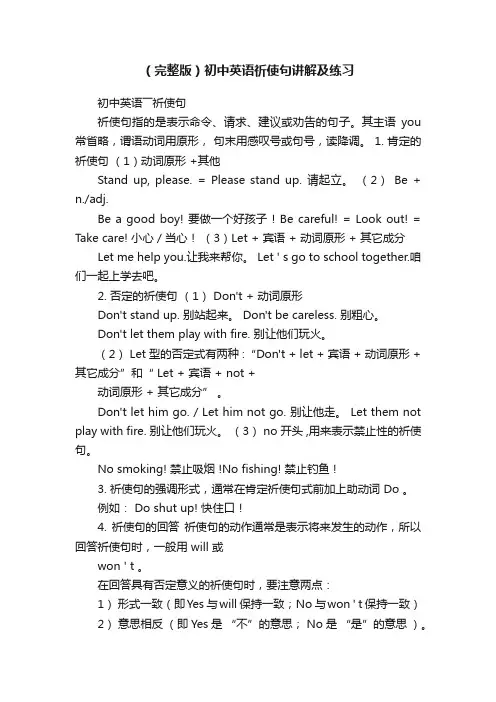
(完整版)初中英语祈使句讲解及练习初中英语――祈使句祈使句指的是表示命令、请求、建议或劝告的句子。
其主语you 常省略,谓语动词用原形,句末用感叹号或句号,读降调。
1. 肯定的祈使句(1)动词原形 +其他Stand up, please. = Please stand up. 请起立。
(2)Be + n./adj.Be a good boy! 要做一个好孩子 ! Be careful! = Look out! = Take care! 小心 / 当心!(3)Let + 宾语 + 动词原形 + 其它成分Let me help you.让我来帮你。
Let ' s go to school together.咱们一起上学去吧。
2. 否定的祈使句(1) Don't + 动词原形Don't stand up. 别站起来。
Don't be careless. 别粗心。
Don't let them play with fire. 别让他们玩火。
(2) Let 型的否定式有两种:“Don't + let + 宾语 + 动词原形 + 其它成分”和“ Let + 宾语 + not +动词原形 + 其它成分” 。
Don't let him go. / Let him not go. 别让他走。
Let them not play with fire. 别让他们玩火。
(3) no 开头 ,用来表示禁止性的祈使句。
No smoking! 禁止吸烟 !No fishing! 禁止钓鱼 !3. 祈使句的强调形式,通常在肯定祈使句式前加上助动词 Do 。
例如: Do shut up! 快住口!4. 祈使句的回答祈使句的动作通常是表示将来发生的动作,所以回答祈使句时,一般用 will 或won ' t 。
在回答具有否定意义的祈使句时,要注意两点:1)形式一致(即Yes 与will 保持一致;No 与won ' t 保持一致)2)意思相反(即 Yes 是“不”的意思; No 是“是”的意思)。
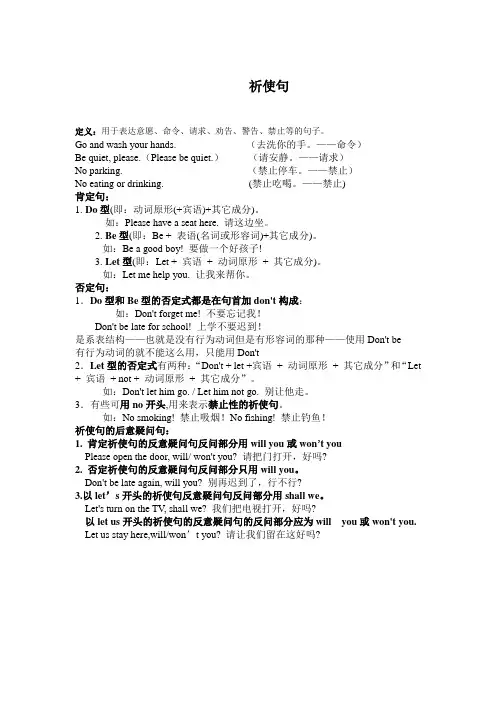
祈使句定义:用于表达意愿、命令、请求、劝告、警告、禁止等的句子。
Go and wash your hands. (去洗你的手。
——命令)Be quiet, please.(Please be quiet.)(请安静。
——请求)No parking. (禁止停车。
——禁止)No eating or drinking. (禁止吃喝。
——禁止)肯定句:1.Do型(即:动词原形(+宾语)+其它成分)。
如:Please have a seat here. 请这边坐。
2.Be型(即:Be + 表语(名词或形容词)+其它成分)。
如:Be a good boy! 要做一个好孩子!3.Let型(即:Let + 宾语+ 动词原形+ 其它成分)。
如:Let me help you. 让我来帮你。
否定句:1.Do型和Be型的否定式都是在句首加don't构成:如:Don't forget me! 不要忘记我!Don't be late for school! 上学不要迟到!是系表结构——也就是没有行为动词但是有形容词的那种——使用Don't be有行为动词的就不能这么用,只能用Don't2.Let型的否定式有两种:“Don't + let +宾语+ 动词原形+ 其它成分”和“Let + 宾语+ not + 动词原形+ 其它成分”。
如:Don't let him go. / Let him not go. 别让他走。
3.有些可用no开头,用来表示禁止性的祈使句。
如:No smoking! 禁止吸烟!No fishing! 禁止钓鱼!祈使句的后意疑问句:1. 肯定祈使句的反意疑问句反问部分用will you或won’t youPlease open the door, will/ won't you? 请把门打开,好吗?2. 否定祈使句的反意疑问句反问部分只用will you。
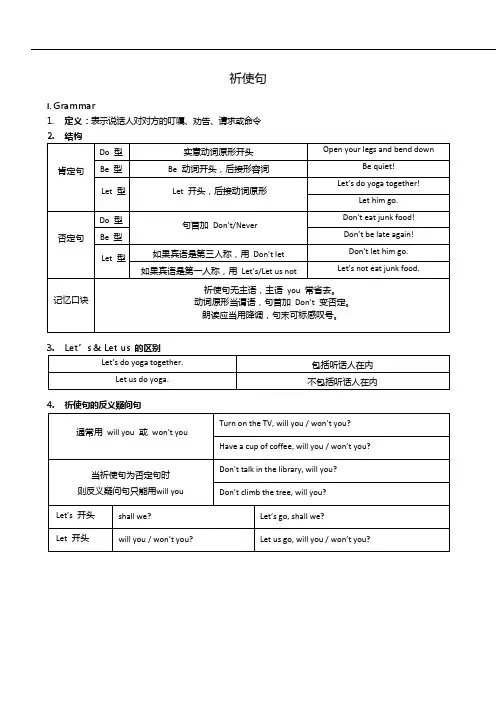
祈使句I.Grammar1.定义:表示说话人对对方的叮嘱、劝告、请求或命令II.Exercise1.and wash your hands.A、GoB、To goC、GoingD、Went2.kind to our brothers and sisters.A、BeingB、To beC、BeenD、Be3.Let's to school.A、to goB、goC、goingD、Went4.Please me look after my baby when I'm out.A、to helpB、helpC、helpingD、helped5.Let me it by myself.A、doingB、to doC、doD、did6.the book here.A、Not putB、Don't putC、Never to putD、Don't putting7.It's raining now. until after the rain.A、Don't let's go out B 、Never let's go outC、Let's not go out D 、Not let's go out8.Not let's go out 8.Sit down, please, ?A、shall weB、will youC、don't youD、shall I答案与解析:祈使句1.考查祈使句。
祈使句有两种类型,一种是以动词原形开头,另一种是在动词原形之前加do(但只限于省略第二人称主语的句子)。
故答案为A。
句意:去洗手。
2.考查祈使句。
祈使句有两种类型,一种是以动词原形开头,另一种是在动词原形之前加do(但只限于省略第二人称主语的句子)。
故答案为D。
句意:对我们的兄弟姐妹要友善。
3.考查let引导的祈使句。
“Let sb.do sth.”让某人做某事。

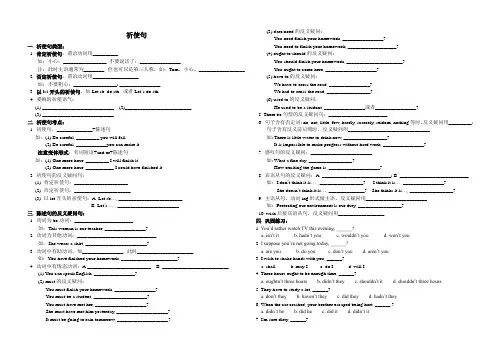
祈使句一. 祈使句类型:1. 肯定祈使句,谓语动词用__________.如:小心:_________________ 不要说话了:________________注:此时主语通常为________, 但也可以是第三人称,如:Tom,小心。
__________________ 2. 否定祈使句,谓语动词用__________________如:不要粗心:_________________; ________________3. 以let开头的祈使句。
如Let sb. do sth. 或者Let’s do sth.4. 委婉的祈使语气:(1) ____________________________ (2)__________________________(3) ____________________________二. 祈使句考点:1. 祈使句,______________+陈述句如:(1) Be careful, _________ you will fail.(2) Be careful, ____________you can make it.注意变体形式:名词短语+and/or+陈述句如:(1) One more hour, _________ I will finish it.(2) One more hour, ___________ I could have finished it.2. 祈使句的反义疑问句:(1) 肯定祈使句:_____________________(2) 否定祈使句:______________________(3) 以let开头的祈使句:A. Let sb…, _________________________B. Let’s …., ________________________三. 陈述句的反义疑问句:1. 动词为be动词:_______________________如:This woman is our teacher, ________________?2. 动词为其他动词:_______________________________如:She wears a shirt, ________________________?3. 动词中有助动词,如________________, 此时______________________如:You have finished your homework, ______________________?4. 动词中有情态动词:A._________________________ B. __________________________(1) You can speak English, ________________?(2) must的反义疑问:You must finish your homework, ________________?You must be a student, _____________________?You must have met her, ____________________?She must have met him yesterday, ____________________?It must be going to rain tomorrow, ____________________?(3) dare/need的反义疑问:You need finish your homework, ________________?You need to finish your homework, ___________________?(4) ought to/should的反义疑问:You should finish your homework, ______________________?You ought to come here, ____________________?(5) have to的反义疑问:We have to cross the road, ________________?We had to cross the road, _________________?(6) used to的反义疑问:He used to be a student, ________________或者________________?5. There be句型的反义疑问句:_______________________6. 句子含有否定词:no, not, little, few, hardly, scarcely, seldom, nothing等时,反义疑问用_________;句子含有反义前后缀时,反义疑问用________________________________如: There is little water to drink now, _________________?It is impossible to make progress without hard work, ________________?7. 感叹句的反义疑问:________________________如: What a fine day, _________________?How exciting the game is, ____________________?8. 宾语从句的反义疑问:A. ___________________________; B. ___________________________如:I don’t think it is…., _________________? I think it is…, ________________?She doesn’t think it is…, ______________? She thinks it is…, _________________?9. 主语从句、动词ing形式做主语,反义疑问用________________________如:Protecting our environment is our duty, _________________?10. wish后接宾语从句,反义疑问用__________________四. 巩固练习:1. You’d rather watch TV this evening, ______?a. isn’t itb. hadn’t youc. wouldn’t youd. won’t you2. I suppose you’re not going today, ______?a. are youb. do youc. don’t youd. aren’t you3. I wish to shake hands with you, ______?a. shallb. may Ic. do Id. will I4. Three hours ought to be enough time, ______?a. oughtn’t three hoursb. didn’t theyc. shouldn’t itd. shouldn’t three hours5. They have to study a lot, ______?a. don’t theyb. haven’t theyc. did theyd. hadn’t they6. When the car crashed, your brother escaped being hurt, ______ ?a. didn’t heb. did hec. did itd. didn’t it7. I'm sure dirty, ______?a. am Ib. isn’t Ic. aren’t Id. am not I8. You seem to be dissatisfied with your present post. I don’t think you judged your ability objectively when you applied for it, ______ you?a. dob. didc. don’td. didn’t9. That’s the sort of the book yo u want, ______?a. is it d. isn’t that c. is that d. isn’t it10. All these dictionaries are a great help to you, ______?a. are theyb. aren’t theyc. are all these dictionariesd. aren’t all these dictionaries11. The movie that we saw last week was quite interesting, ______?a. wasn’t itb. was itc. didn’t wed. weren’t we12. Tom has been writing letters all afternoon, but he should have finished them by now, ______?a. hasn’t heb. has hec. shouldn’t hed. didn’t you13. David told me that you would take a trip to America, ______?a. would youb. wouldn’t youc. did youd. didn’t you14. There appeared to be no better way, _______?a. was thereb. were therec. did thered. didn’t t here15. You has some trouble finding where I live, ______?a. didn’t youb. hadn’t youc. do Id. don’t I16. He has his hair cut every month, ______?a. has heb. hasn’t hec. does hed. doesn’t he17. Your friend needs to come earlier, ______?a. does heb. doesn’t hec. need hed. needn’t he18. The little boy dare not go to church, ______?a. dare heb. daren’t hec. does hed. doesn’t he19. Susan’d have worked abroad if she’d had the chance, ______?a. has sheb. hadn’t shec. would shed. wouldn’t she20. Everyone’s having a good time, ______?a. is heb. isn’t everyonec. does hed. aren’t they21. Any one can join the club, ______?a. can any oneb. can’t any onec. can’t theyd. can they22. Tell me how to operate the electronic computer, ______?a. will youb. shan’t youc. do youd. don’t you23. Magaret scarcely comes to visit you on Christmas Day, ______?a. doesn’t sheb. does shec. do youd. don’t you24. Let’s listen to the radio program that the teacher mentioned, ______?a. do web. don’t wec. shall wed. shan’t we25. You think you’re funny, ______?a. didn’t youb. are youc. don’t youd. do you26. Janet used to take part in labor in that village, ______?a. used sheb. did shec. didn’t shed. should she27. What beautiful weather, ______?a. is itb. isn’t itc. won’t itd. doesn’t it28. He ought to go to Kwangchow by plane, ______?a. should heb. shouldn’t hec. would hed. wouldn’t he29. We never dared to ask him a question, ______?a. did web. didn’t wec. dared wed. daren’t we30. Nobody will believe how difficult his work has been ______?a. will heb. won’t nobodyc. will theyd. won’t they31. You must have made the mistake, ______?a. mustn’t youb. haven’t youc. didn’t youd. hadn’t you32. Learning how to repair computers takes a long time, ______?a. isn’t itb. aren’t theyc. doesn’t itd. don’t they33. Jack has coffee with breakfast, ______?a. hasn’t Jackb. hasn’t hec. doesn’t Jackd. doesn’t he34.They must have stayed at hotel last night, ______?a. mustn’t theyb. haven’t theyc. didn’t theyd. hadn’t they35.There isn’t anything wrong with the radio, ______?a. is thereb. is itc. does itd. does there36.You must be hungry, ______?a. must youb. mustn’t youc. are youd. aren’t you37.Let’s do the exercises by o urselves, ______?a. shall web. shan’t wec. will youd. will we38. Her daughter had the carpets and curtains cleaned, ______?a. had sheb. hadn’t shec. didn’t shed. didn’t her daughter39.The teacher had a talk with you, ______?a. has youb. hadn’t shec. did shed. didn’t she40.Something’ll have to be done about the air pollution, ______?a. won’t itb. will itc. has itd. does it反意疑问句练习答案。
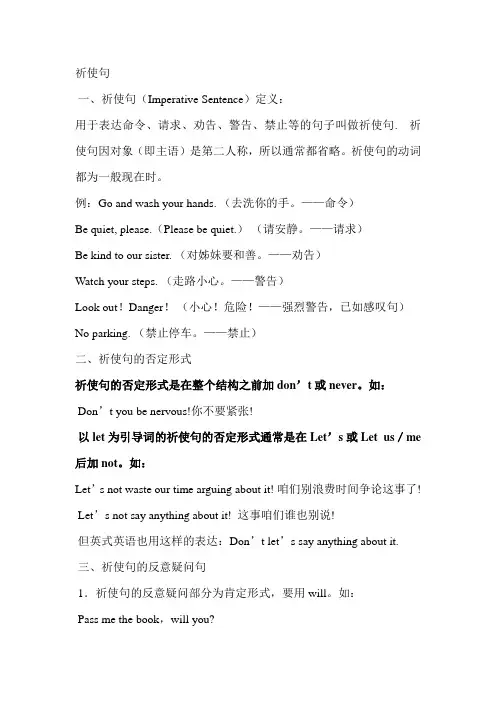
祈使句一、祈使句(Imperative Sentence)定义:用于表达命令、请求、劝告、警告、禁止等的句子叫做祈使句. 祈使句因对象(即主语)是第二人称,所以通常都省略。
祈使句的动词都为一般现在时。
例:Go and wash your hands. (去洗你的手。
——命令)Be quiet, please.(Please be quiet.)(请安静。
——请求)Be kind to our sister. (对姊妹要和善。
——劝告)Watch your steps. (走路小心。
——警告)Look out!Danger!(小心!危险!——强烈警告,已如感叹句)No parking. (禁止停车。
——禁止)二、祈使句的否定形式祈使句的否定形式是在整个结构之前加don’t或never。
如:Don’t you be nervous!你不要紧张!以let为引导词的祈使句的否定形式通常是在Let’s或Let us/me 后加not。
如:Let’s not waste our time arguing about it! 咱们别浪费时间争论这事了! Let’s not say anything about it! 这事咱们谁也别说!但英式英语也用这样的表达:Don’t let’s say anything about it. 三、祈使句的反意疑问句1.祈使句的反意疑问部分为肯定形式,要用will。
如:Pass me the book,will you?2.Let’s表示第一人称的祈使句,反意疑问句为“Shall we?”。
如: Let’s go for a walk,shall we?Let’s forget it,shall we?3.Let me和Let us 表示第二人称的祈使句,反意疑问句为“will you?”。
如:Let us go for a walk,will you?4.其它行为动词引起的祈使句,无论其陈述部分是否定还是肯定的祈使句,多用“will you?”,表一种客气的语气。
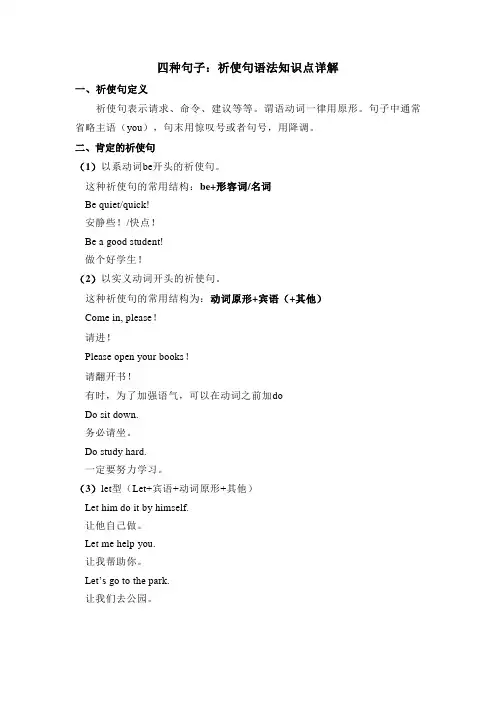
四种句子:祈使句语法知识点详解一、祈使句定义祈使句表示请求、命令、建议等等。
谓语动词一律用原形。
句子中通常省略主语(you),句末用惊叹号或者句号,用降调。
二、肯定的祈使句(1)以系动词be开头的祈使句。
这种祈使句的常用结构:be+形容词/名词Be quiet/quick!安静些!/快点!Be a good student!做个好学生!(2)以实义动词开头的祈使句。
这种祈使句的常用结构为:动词原形+宾语(+其他)Come in, please!请进!Please open your books!请翻开书!有时,为了加强语气,可以在动词之前加doDo sit down.务必请坐。
Do study hard.一定要努力学习。
(3)let型(Let+宾语+动词原形+其他)Let him do it by himself.让他自己做。
Let me help you.让我帮助你。
Let’s go to the park.让我们去公园。
三、否定的祈使句(1)be型(Don’t be +其他成分(形容词、名词或介词短语))Don’t be careless!别粗心。
Never be late again next time!下次不要再迟到。
注意:①在这种句型中,be不能省略②否定副词not不可置于be之后(2)do型(Don’t +动词原形+其他)Don’t believe him!别相信他!Don’t worry!别担心!Never do it again!不要再这样做了!(3)Let引起的祈使句有两种否定形式①Let+宾语+not+动词原形+其他Let her not do that.别让她那样做。
Let’s not think about it. It’s only a waste of time.咱们别考虑了。
只是浪费时间。
②Don’t+ let+宾语+动词原形+其他Don’t let Jim do that.别让Jim那样做。
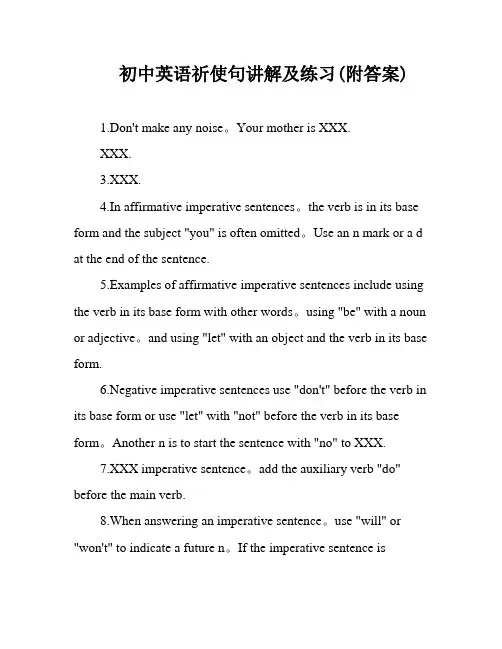
初中英语祈使句讲解及练习(附答案)1.Don't make any noise。
Your mother is XXX.XXX.3.XXX.4.In affirmative imperative sentences。
the verb is in its base form and the subject "you" is often omitted。
Use an n mark or a d at the end of the sentence.5.Examples of affirmative imperative sentences include using the verb in its base form with other words。
using "be" with a noun or adjective。
and using "let" with an object and the verb in its base form.6.Negative imperative sentences use "don't" before the verb in its base form or use "let" with "not" before the verb in its base form。
Another n is to start the sentence with "no" to XXX.7.XXX imperative sentence。
add the auxiliary verb "do" before the main verb.8.When answering an imperative sentence。
祈使句祈使句指的是表示命令、请求、建议或劝告的句子。
其主语you常省略,谓语动词用原形,句末用感叹号或句号,读降调。
1. 肯定的祈使句(1)动词原形+其他Stand up, please. = Please stand up. 请起立。
(2)Be + n./adj.Be a good boy! 要做一个好孩子! Be careful! = Look out! = Take care! 小心 / 当心!(3)Let + 宾语 + 动词原形 + 其它成分Let me help you. 让我来帮你。
Let’s go to school together. 咱们一起上学去吧。
2. 否定的祈使句(1) Don't + 动词原形Don't stand up. 别站起来。
Don't be careless. 别粗心。
Don't let them play with fire. 别让他们玩火。
(2)Let型的否定式有两种:“Don't + let + 宾语+ 动词原形+ 其它成分”和“Let + 宾语 + not + 动词原形 + 其它成分”。
Don't let him go. / Let him not go. 别让他走。
Let them not play with fire. 别让他们玩火。
(3)no开头,用来表示禁止性的祈使句。
No smoking! 禁止吸烟!No fishing! 禁止钓鱼!3. 祈使句的强调形式,通常在肯定祈使句式前加上助动词Do。
例如:Do shut up! 快住口!4. 祈使句的回答祈使句的动作通常是表示将来发生的动作,所以回答祈使句时,一般用 will或won’t。
在回答具有否定意义的祈使句时,要注意两点:1) 形式一致(即Yes与will保持一致;No与won’t保持一致)2) 意思相反(即Yes是 “不”的意思;No是 “是”的意思)。
祈使句的练习题汇总及答案一、祈使句的概念祈使句是用于表达命令、请求、劝告、警告、禁止等语气的句子。
它的主语通常是 you(但常常被省略),谓语动词用原形。
二、祈使句的类型1、肯定祈使句以动词原形开头,如:Stand up! (起立!)以 Let 开头,如:Let's go (我们走吧。
)2、否定祈使句Don't +动词原形,如:Don't be late (别迟到。
)Never +动词原形,如:Never give up (永不放弃。
)三、练习题(一)将下列句子改为祈使句1、 You should do your homework carefullyDo your homework carefully2、 You mustn't smoke hereDon't smoke here(二)选择正确的祈使句形式1、() open the door, pleaseA DoB Don'tC Please答案:A解释:“Do open the door, please”是一种强调的祈使句形式,意思是“请一定要开门”。
2、() talk loudly in the libraryA Don'tB DoC Please答案:A解释:图书馆是需要保持安静的场所,应该是“不要大声说话”,用Don't 。
(三)用所给动词的适当形式完成祈使句1、()(read) this book carefully答案:Read解释:祈使句用动词原形。
2、()(not play) football in the street答案:Don't play解释:否定祈使句用 Don't +动词原形。
(四)根据情境,写出合适的祈使句1、你想让对方安静,你说:Be quiet!2、老师想让同学们打开课本,老师说: Open your books, please(五)判断下列句子是否为祈使句1、 How beautiful the flower is!不是,这是一个感叹句。
祈使句精讲与练习〔含答案〕一、祈使句〔Imperative Sentence〕定义:用于表达命令、请求、劝告、警告、禁止等的句子叫做祈使句.祈使句因对象〔即主语〕是第二人称,所以通常都省略。
祈使句的动词都为一般现在时,句末则使用句号来表示结束。
例:Go and wash your hands. 〔去洗你的手。
——命令〕Be quiet, please.〔Please be quiet.〕〔请安静。
——请求〕Be kind to our sister. 〔对姊妹要和善。
——劝告〕Watch your steps. 〔走路小心。
——警告〕Look out!Danger!〔小心!危险!——强烈警告,已如感叹句〕No parking. 〔禁止停车。
——禁止〕祈使句也常把主语“You〞表达出来,使对方听起来觉得柔和些,例如:You go and tell him, Chris. 〔克立斯你去告诉他。
〕二、相关口令祈使句无主语,主语you常省去;动词原形谓语当,句首加don't否定变;朗读应当用降调,句末常标感叹号。
三、表现形式●肯定结构:1. Do型(即:动词原形(+宾语)+其它成分)。
如:Please have a seat here. 请这边坐。
有的祈使句在意思明确的情况下,动词可省略。
如:This way, please. = Go this way, please. 请这边走。
2. Be型(即:Be + 表语(名词或形容词)+其它成分)。
如:Be a good boy! 要做一个好孩子!3. Let型(即:Let + 宾语+ 动词原形+ 其它成分)。
如:Let me help you. 让我来帮你。
●否定结构:1. Do型和Be型的否定式都是在句首加don't构成。
如:Don't forget me! 不要忘记我!2. Let型的否定式有两种:“Don't + let + 宾语+ 动词原形+ 其它成分〞和“Let + 宾语+ not + 动词原形+ 其它成分〞。
祈使句知识点总结祈使句用于表达意愿、命令、请求、劝告、警告、禁止等的句子叫做祈使句。
祈使句因对象(即主语)是第二人称,所以通常都省略。
祈使句的分类1. 表示请求:Close the door, please. 请关门。
Turn down the radio, please. 请将收音机调小。
2. 表示命令:Keep quiet! 请安静!Do your homework. 做你的作业。
3. 表示提醒或劝告:Be careful! It's dangerous. 小心!危险。
Look out! The bus is coming. 当心!公交车来了。
4. 表示禁止:No smoking. 禁止吸烟。
No photos. 禁止拍照。
5. 表示建议:Let me try. 让我试试。
Let's have a rest. 我们休息一下。
6. 表示邀请:Help yourself. 请随便吃。
Come on and join us!来加入我们吧!祈使句的构成1.祈使句的肯定式祈使句的肯定式用动词原形。
如:Look at the blackboard. 请看黑板。
Be quiet! 请安静!2. 祈使句的否定式祈使句的否定式用"don't/ never+动词原形" 的形式。
如:Don't worry. 别担心。
Never mind. 别介意。
3. 祈使句的let 式以let 引起的句子也是祈使句,常用于第一人称和第三人称,表示建议。
如:Let me see. 让我想想。
Let's go home. 让我们回家。
祈使句口诀:祈使句无主语,主语you常省去;动词原形谓语当,句首don't变否定;朗读应当用降调,句末常标感叹号。
祈使句家庭作业练习一、将下列句子改写成祈使句Example:He told us not to go there. Don’t go there!He asked us to help him. Please help me.1.He told us not to make so much noise.__________________________________ 2.He told us to listen to him when he is speaking. __________________________________ 3.He asked us to be nice to each other.__________________________________ 4.He asked us to be kind to our grandparents. __________________________________ 5.He told us to get out of the house.__________________________________ 6.He asked us to help him with his homework.__________________________________二、重组句子1.homework / do / let’s / our__________________________________ 2.your / to / listen / grandfather__________________________________ 3.dinner / meet / let’s / on / for / Saturday __________________________________ 4.your / room / clean__________________________________ 5.for / eat / breakfast / don’t / ice cream __________________________________答案:一、1.Don’t make so much noise.2.Please listen to him when he is speaking.3.Please be nice to each other.4.Please be kind to our grandparents.5.Please get out of the house.6.Please help him with his homework.二、1.Let’s do our homework.2.Listen to your grandfather.3.Let’s meet for dinner on Saturday.4.Clean your room.5.Don’t eat ice cream for breakfast.。
祈使句一、祈使句( Imperative Sentence)定义:用于表达命令、请求、劝告、警告、禁止等的句子叫做祈使句.祈使句因对象(即主语)是第二人称,所以通常都省略。
祈使句的动词都为一般现在时。
例: Go and wash your hands.(去洗你的手。
——命令)Be quiet, please(. Please be quiet). (请安静。
——请求)Be kind to our sister. (对姊妹要和善。
——劝告)Watch your steps.(走路小心。
——警告)Look out!Danger!(小心!危险!——强烈警告,已如感叹句)No parking. (禁止停车。
——禁止)二、祈使句的否定形式祈使句的否定形式是在整个结构之前加don’t 或 never。
如:Don’t you be nervous!你不要紧张 !以 let 为引导词的祈使句的否定形式通常是在Let’s 或 Let us/me 后加 not。
如:Let’s not waste our time arguing about it!咱们别浪费时间争论这事了! Let’s not say anything about it! 这事咱们谁也别说 !但英式英语也用这样的表达:Don’t let’s say anything about it.三、祈使句的反意疑问句1.祈使句的反意疑问部分为肯定形式,要用will 。
如:Pass me the book,will you?2.Let’s 表示第一人称的祈使句,反意疑问句为“Shall we?”。
如:Let’s go for a walk,shall we?Let’s forget it,shall we?3.Let me 和 Let us 表示第二人称的祈使句,反意疑问句为“will you?”。
如:Let us go for a walk, will you?4.其它行为动词引起的祈使句,无论其陈述部分是否定还是肯定的祈使句,多用“ will you? ”,表一种客气的语气。